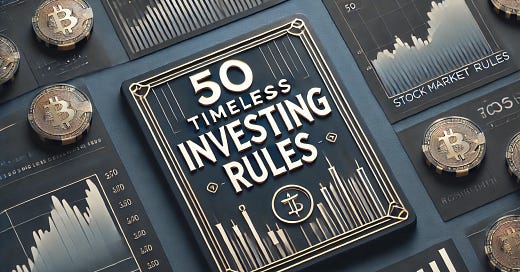This publication is free. But if you find value in it, feel free to show your support with no more than the cost of your favorite coffee:
Dear Investor,
some investing rules are timeless but too short to fill an entire article.
Here are 50 of them:
If you buy for a reason and the reason is no longer valid, then sell.
Don’t blame your mistakes on the market.
If you get on the wrong train, get off at the nearest station, the longer it takes you to get off, the more expensive the return trip will be.
The difference between playing the stock market and the horses is that one of the horses must win.
Predicting rain doesn’t count, building the ark does.
When a sector is hot, you can be sure the big firms will create a fund that specializes in that area - not because it’s good for your financial future, but because it’s easy to sell.
Who does not own shares when their prices drop, will not own shares when their prices soar.
Hype stocks are a tax for people who don’t understand fundamentals.
The market is not efficient, but it’s still tough to beat.
Don’t play all the time.
Don’t let your opinion on what should happen bias your investing strategy.
Investing should be done with disposable income. Not with income you need.
Experience is knowledge. Everything else is information.
The account that is left alone for the most part is one that will likely perform best.
Cash is not trash. It’s an option on finding value in the future.
In the short-term, the crowd if more often wrong than right. In the long-term, the crowd is more often right than wrong.
Dividends are an elegant value indicator as they favor companies that at least make a profit.
Your portfolio should not be exposed to risk, but instead to opportunities.
Don’t invest in a leveraged company. Instead, use leverage to invest in an unleveraged one.
Optimism and pessimism have no place in the market. The big money is made by realists.
Keep it simple is the catchphrase of a good model.
When everybody likes a stock, it must go down. When nobody likes a stock, it may go up.
Investing is a probabilities game, not a certainties game.
More stocks double than go to zero.
In a bull market, be bullish.
Never own a stock if the corporate title includes “Universal”, “Global”, or “Intergalactic”.
If all the economists in the world were laid end to end, they wouldn’t reach a conclusion.
Trying to bet on the next best thing is not investing, it’s gambling.
No matter how big and scary some news sound, we’ve almost always been through something similar before.
Consider the range of likely outcomes and then form forward-looking expectations based on probabilities.
Learn market history and use it as a laboratory to understand the range of reasonable expectations.
An economist is a guy who is fascinated with numbers but who doesn’t have enough personality to become an accountant.
You’ll never know all the answers.
Investing should be more like watching paint dry or watching grass grow. If you want excitement, take $800 and go to Las Vegas.
Buy when you see value because it’s unlikely that you will time the bottom.
Look out for announcements of growth initiatives.
Investing is a game in which time works as an asset rather than a liability. Most peoples plans, when you add time, get worse. What you wanna do is play games where you wait you win.
A dull company name should get your attention. No one takes “John’s Tasty Fruits” serious - until it’s too late and the price is up.
At major turning points in markets, market prognosticators are generally wrong.
Most people who are lucky enough to sell something before it goes down get so busy patting themselves on the back they forget to buy it back.
When markets are falling, the potential for future appreciation in stocks generally increases.
Invest in companies whose products or services are regarded as irreplaceable by their customers.
Really good businesses usually don't need to borrow.
The years say what the days can't tell.
Investors often assume when a decision is followed by a good outcome, the decision was good, which isn't always true.
Investing is kind of a game of connecting the dots. The nice thing about it is the longer you are in the business, as long as you are intellectually curious, your collection of data points gets bigger and bigger.
Often investors invent a thesis to justify a trend.
The best long-term margin of safety comes not from an investment’s price but from the value of a company’s competitive advantage.
Find outstanding businesses at sensible prices, not a mediocre business at a bargain price.
Time arbitrage is one of the biggest behavioural advantages anyone can really have.
Until the next issue. 👋
Premium Content 📈
The next stock analysis for long-term investors is getting prepared and will be send out with the next newsletter. If you’re a new reader, then read the last article where I explain one of the core ratios of my analysis:
To get access to the last report read the introduction and click the link at the end of the article:
If you enjoy The Onveston Letter, let me know by clicking the “Like” button ❤️.
And if you aren’t a subscriber yet, then sign up below to not miss out on future articles.
For new readers: Check out all my previous posts here
Disclaimer: This analysis is not advice to buy or sell this or any stock; it is just pointing out an objective observation of unique patterns that developed from my research. Nothing herein should be construed as an offer to buy or sell securities or to give individual investment advice.
Thumbnail by Dall-E





